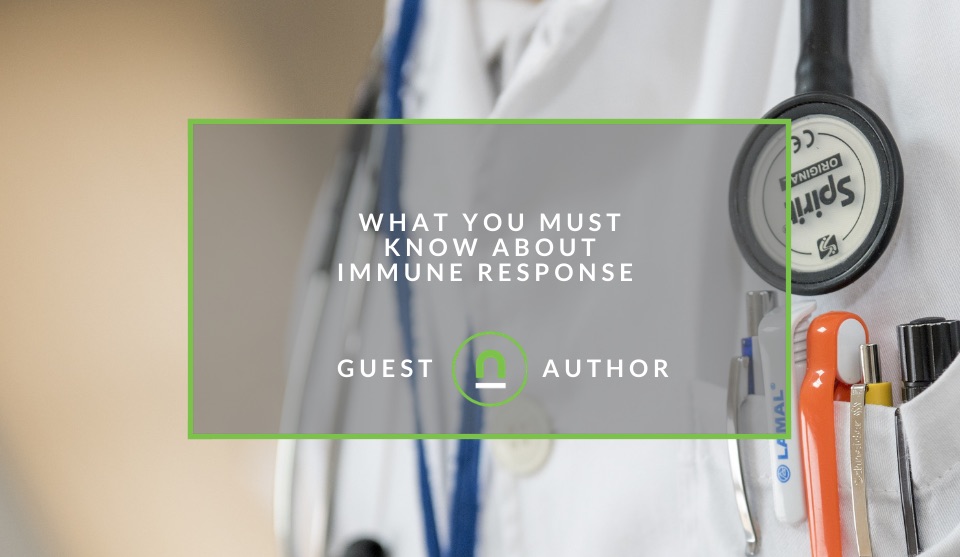Recent posts

Money Talks
XRP vs. Stablecoins: Which Is Better for Cross-Border Payments in 2026?
28 January 2026

Press Releases
Sleep Expert Cautioning Against TikTok’s ‘Mouth Taping’ Trend
28 January 2026

Press Releases
Why Vintage Watches Are the Hottest Trend in 2026
27 January 2026

Press Releases
Africaworks Accelerates The Rollout Of Real Estate Investment Platform
20 January 2026
Popular posts
Extravaganza
Trending Music Hashtags To Get Your Posts Noticed
24 August 2018
Geek Chic
How To Fix iPhone/iPad Only Charging In Certain Positions
05 July 2020
Extravaganza
Trending Wedding Hashtags To Get Your Posts Noticed
18 September 2018
Money Talks
How To Find Coupons & Vouchers Online In South Africa
28 March 2019
What You Must Know about Immune Response
14 November 2019 | 1 comments | Posted by Walter Moore in Doctors Orders
What is the immune response? It is the reaction through which the human body identifies and protects viruses, bacteria, and other elements that seem damaging and alien. The human immune system protects you from disease-causing viruses by responding to antigens.
Antigens are nothing but proteins on the cell surface, bacteria or fungi. Then, did you know that chemicals, toxins, foreign particles, and drugs could also be antigens? The immune system identifies and obliterates or destroys materials containing antigens.
According to an article published on Huffington Post Canada, you can also boost immunity with foods like chicken noodle soup, mushrooms, onion, garlic, citrus fruits, and more. Read on to learn more about the immune response.
Innate immunity
Nonspecific or innate immunity is that defence system with which we all are born. It helps in protecting you against antigens and involves obstacles to keep damaging elements from intruding your body. The hurdles are called the first line of defence when it comes to immune response. The typical examples are enzymes in the skin and tear oils, cough reaction, skin, and mucus trapping bacteria, and little particles, and stomach acid.
Did you know that innate immunity also comes in the form of protein, known as innate humoral immunity? Even when an antigen gets past these obstacles, the other parts of the human immune system attack and hurt the antigens. You know now that antigens are substances triggering an immunogenic response.
Passive immunity
Passive immunity occurs because of antibodies, which are manufactured in the body, save for your own. When it comes to passive immunity, they have passive immunity, as they are born with the said antibodies.
Then, these antibodies are moved via the placenta from the mother to the baby. The said antibodies wane when the baby is 6 to 12 months of age. Passive immunization also occurs due to an injection of antiserum that holds antibodies, which are produced by a different individual or living being.
It offers instant defence against an antigen but does not provide continuous protection. Tetanus antitoxin and immune serum globulin for hepatitis susceptibility are typical examples of passive vaccination.
Blood components
When it comes to this immune system, it incorporates specific kinds of white blood cells. It also means proteins and chemicals in the blood. These include complement proteins, antibodies, and interferon. A couple of these substances attack foreign elements in the human body.
The others team up to assist the cells in the immune system. As far as lymphocytes are concerned, these are a kind of white blood cell, which are B and T type lymphocytes. When it comes to B-lymphocytes, these become cells creating antibodies.
Antibodies fasten to a precise antigen and make it simpler for the immune cells to damage the antigen.T lymphocytes hit antigens unswervingly and assist in controlling the immune response. They to discharge chemicals, called cytokines that manage the whole immune response.
These B and T lymphocytesletthe immune system to act in response quickly and more resourcefully the next time a person is vulnerable to a similar antigen. In most of these situations, it will stop you from falling sick.
Conclusion
A sound and healthy immune system protect us from ailments and disorders. Therefore, excess or too little or inaccurate immune response leads to immune system issues or complications.
About the author
Walter Moore is a health expert who has been running many health seminars and public discussions. He also manages his blog and reviews the health-related details provided by authentic sources.
Tell us your story
Would you like to write for nichemarket just like Jessica has? Find out how to submit a guest post and when you're ready, you can contact us.
Are you looking to promote your business?
South African medical businesses can create your free business listing on nichemarket. The more information you provide about your business, the easier it will be for your customers to find you online.
Registering with nichemarket is easy; all you will need to do is head over to our sign up form and follow the instructions. If you require a more detailed guide on how to create your profile or your listing, then we highly recommend you check out the following articles.
Recommended reading
If you enjoyed this post and have time to spare why not check out these related posts and dive deeper down the rabbit hole that is health and hygiene.
- The Best Diet To Combat Arthritis
- Google Brings Some Colour To Medical Knowledge Cards
- 10 Benefits of Hemp Seed Oil for Great Health
Tags: Health, Guest Post
You might also like
80% of Gen-Zers Would Marry an AI
19 January 2026
Posted by Steph M in Press Releases
Experts reveal why AI relationships are getting serious, and the reasons why 4 in 5 young people are open to marrying ai as human dating becomes too ...
Read moreCommon ASO Mistakes African App Developers Make
09 January 2026
Posted by Daniel Davis in Industry Experts
ASO is Localisation, Not Translation: Failing to research specific local search terms and cultural nuances is the biggest ASO error in African market...
Read more{{comment.sUserName}}
{{comment.iDayLastEdit}} day ago
{{comment.iDayLastEdit}} days ago
 {{blogcategory.sCategoryName}}
{{blogcategory.sCategoryName}}


